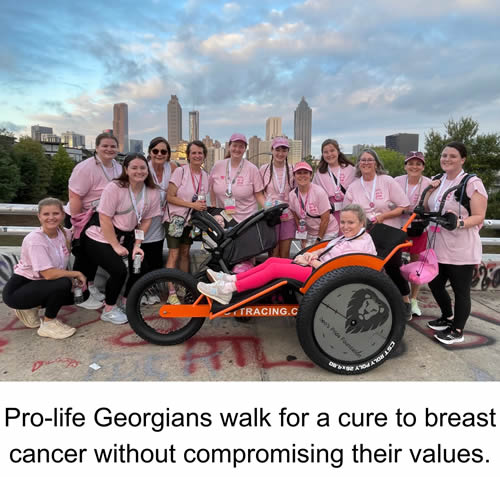 The Prevention of Cancer Prevention
The Prevention of Cancer Prevention
Planned Parenthood published a six-page article on its website in March 2013 titled, “Myths about abortion and Breast Cancer.” This type of article pervades other resources such as Healthline, American Cancer Society, and National Abortion Federation.
However, research shows that there is a link between abortions and breast cancer. But this kind of information would potentially damage a billion-dollar industry. Therefore, these risks have been either minimized or outright denied.
The Facts
Approximately 13% (about one in eight) of U.S. women will develop invasive breast cancer during their lifetime. Those are shocking numbers. And in recent years, these statistics have increased slightly by 0.5% per year. In the United States, breast cancer causes the second highest number of cancer-related deaths, only second to lung cancer.
The risk for breast cancer among women who have had any elective abortions is 52% higher than women who have not had abortions. The reason for this is, of course, scientific.
During pregnancy, estrogen levels in a woman’s body increase. This increase signals identical cells in her breasts to multiply. By the time the woman gives birth, these cells will have stopped multiplying and will have developed into milk-producing cells.
However, when the pregnancy process is cut short by abortion before the third trimester, the woman’s body is not naturally ready for the sudden change. It has too many identical cells that no longer have a purpose. So, the confused cells may continue to multiply, which may in turn become cancerous.
The Issue
This kind of risk should be widely publicized, and woman considering abortion should be made aware of the danger. However, not only do abortion mills conceal this information from women and their families, but they also seek to discredit research proving the risks.
In 1989, Holly Howe, a researcher at the New York State Department of Health, set up a carefully designed study of New York State’s cancer and fetal death registries. She found that abortive methods severely disrupted a woman’s natural pregnancy process, leaving her body vulnerable and open to threats.
This potent information would affect the profitability of the abortion industry. Thus, within months of Howe’s findings being published, Family Health International (FHI), a research arm of the abortion industry, issued its own rushed study.
Though FHI tried to discredit Howe’s research, there are significant gaps in its research.
Many other successful studies followed Howe’s which point to abortion’s definite connection with breast cancer, but FHI’s erroneous study stayed in the spotlight, and those at the frontlines of “female reproductive health” continue to this day to loudly insist that abortion is a safe and reliable procedure.
Non-medical Evidence
Lastly, it is important to note that communities that reject abortion on medical or moral grounds boast far fewer cases of breast cancer than communities that support abortion do.
As an example, declared atheists are far more likely to suffer from breast cancer than orthodox Jews and Catholics. One might argue that this finding is due to local factors such as nutrition; however, these statistics are consistent globally.
Also, women from certain ethnic communities targeted by the abortion industry have a far greater risk for breast cancer than those from less-targeted ethnic communities.
Silence from the Cancer Awareness Community
This deception does not only come from the abortion industry. One of the largest breast cancer awareness organizations, Susan G. Komen, has continued to fund Planned Parenthood throughout the years. In 2020, Susan G. Komen donated $680,000 to Planned Parenthood, making it one of Planned Parenthood’s largest donors.
Susan G. Komen’s website declares that its mission has helped reduce breast cancer mortality by more than 42%. Yet, it actively supports an industry that aggravates the risk of breast cancer.
Neutral Breast Cancer Organizations
Susan G. Komen’s massive donations to Planned Parenthood make the organization unsuitable for pro-life donors. However, there are many local and national breast cancer organizations that do not support the abortion industry or receive donations from companies that do.
Below is a list of “clean” options geared toward breast cancer research and treatment. They are not explicitly pro-life; however, they do not receive donations from pro-abortion organizations such as some commercial luxury brands or have a position statement on “reproductive rights” as some of their competitors.
National
- The American Breast Cancer Foundation (ABCF)
- The National Breast Cancer Foundation
Georgia-specific
- Georgia Alliance for Breast Cancer (GAABC)
- Sisters by Choice
As leadership changes or cultural pressures influence organizations over time, it is so important to regularly check in with those whom you support to ensure they still align with your convictions.
Sources:
https://www.ewtn.com/catholicism/library/link-between-abortion–breast-cancer-11985
https://www.fhi360.org/articles/statement-us-supreme-court-decision/
https://www.opensecrets.org/outside-spending/detail/2022?cmte=Planned+Parenthood&tab=donors
https://www.nationalbreastcancer.org/
Virginia-Lee Dalton
Georgia Right to Life
Intern
